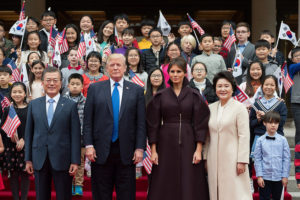
President Donald J. Trump and First Lady Melania Trump visit South Korea | November 7, 2017 (Official White House Photo by Andrea Hanks)
Harry Kazianis, director of defense studies at the Center for The National Interest, examines the possibilities that may emerge from the potential U.S./North Korea summit in Singapore. Kazianis believes there’s a deal to be had, and that using containment, the strategy that successfully defeated the Soviets, is a better track than using “regime change,” or “kinetic conflict,” which has failed so miserably for America. He writes at The American Conservative (abridged):
While I certainly have my doubts—there is a very real possibility that a U.S.-North Korea summit will not happen—both sides could still decide to press forward with a meeting in Singapore on June 12, in what would be the ultimate diplomatic Hail Mary. Diplomats from both sides could gamble that the pull of making history could help bridge the gap, and forge an agreement that sees the Kim regime at least slowly ridding itself of its nuclear arsenal.
I would argue that there is still a deal to be had that both sides could accept. There is also a very real possibility of a step-by-step approach, where the hermit kingdom gives away pieces of not only its atomic arsenal but also its chemical, biological, and missile programs in exchange for sanctions relief and economic aid. In fact, U.S. officials seem to be dropping hints that this could happen, testing the diplomatic waters in the media to see if it will stick.
While North Korea is clearly a nuclear threat, Washington has a history of dealing with and deterring nations that have such weapons and would seek to do us harm. In fact, we were able to contain and place the Soviet Union on the ash heap of history—a nation that had thousands of nuclear weapons and long-range missiles that could have turned America into an atomic parking lot many times over without firing a shot.
While our main instruments of foreign policy over the past two decades have been regime change and kinetic conflict, America is very good at using maximum pressure—we use to call it containment during the Cold War—to combat our international adversaries. We would be wise to re-read our own history.
Read more here.
If you’re willing to fight for Main Street America, click here to sign up for my free weekly email.




